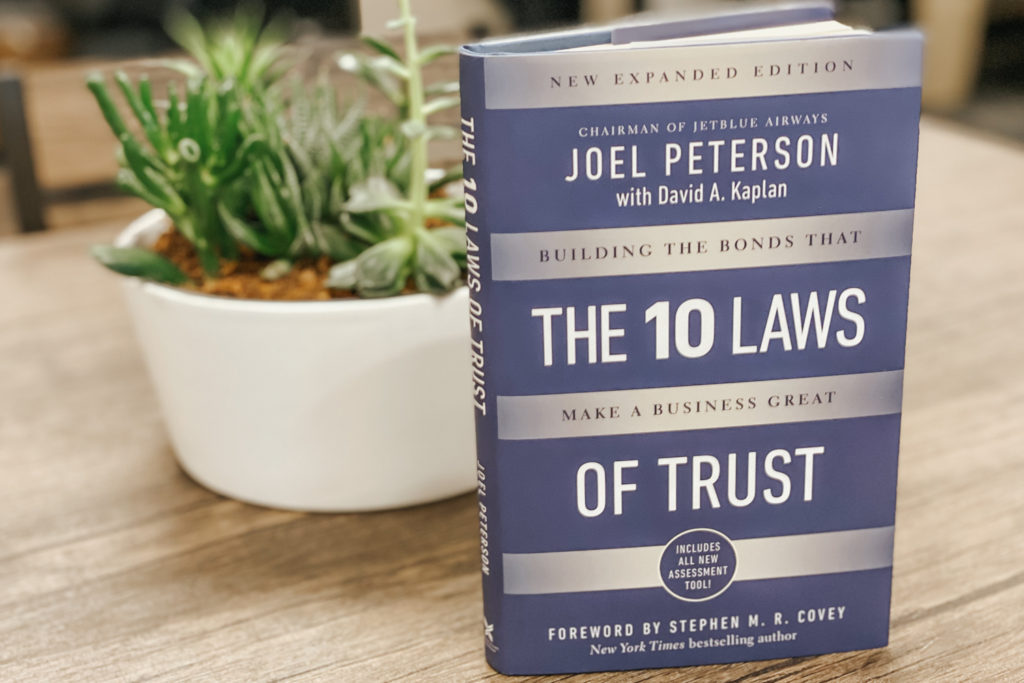I recently got the chance to talk “trust” with Joel Peterson, chairman of JetBlue Airways. Since I trust until given a reason not to, I was curious about Joel’s take on the topic, especially after reading his book, The 10 Laws of Trust: Building the Bonds that Make a Business Great.
In the business world, is it risky to lead with trust? Is there a secret to creating a trust culture? Luckily, there was no better person than Joel Peterson to answer my questions.

The Importance of Trust in Business
Everyone would probably agree that trust is important, but sometimes it’s tough to verbalize the “why.” In my interview with Joel, he began by emphasizing that trust is ideal when business is good, but it also engenders loyalty– both among cooperating business and among employees– when the going gets tough.
He explained, “If things aren’t going really well, there’s nothing like trust to allow lenders to keep lending you money and investors to keep putting money with you, suppliers to provide goods, employees to stay with you. You know, they have to trust you to do that. So when times are good, sometimes people are able to manage by power alone, but trust is more reliable over the long run.”
Two Kinds of Betrayals
We quickly got onto the topic of being “burned” and how that can be quite the hindrance to developing a trust culture at work. Joel explained that there are two types of betrayal in a work environment. The unintentional betrayal, where “people just don’t deliver on what they said they would do,” is something we’ve all probably experienced. This can be a result of unclear expectations or intervening variables, but either way, it’s “not intentional.” But the other type of betrayal includes intentional deceit like lying, cheating, or stealing.
In the former type of betrayal, Joel encourages us to address this issue with honesty, communication, and understanding. In other words, it’s fixable and, ironically, these situations can actually provide an opportunity to build trust through the misunderstanding. In the latter, though, he warns that we should avoid doing business in these situations and avoid holding a toxic grudge.
Growing Trust Out of Misunderstanding
I was curious about how Joel managed to earn back trust when he was a part of one of those “unintentional betrayals” that we had talked about. Joel said that the answer lies in understanding. He explained that he communicates and clarifies what happened by asking, “Did this disappoint you? Did you have a different expectation?”
What a simple but profound concept. He continued, “And I think once you’ve understood you’ve done something to offend, then there’s nothing quite like an apology. And a lot of people don’t know how to make an effective apology. You can’t say, ‘I’m sorry if you thought…’ That’s an accusation, not an apology. A complete apology is to say, ‘I let you down, I am really sorry about that, and it won’t happen again,’ or ‘Here’s what I want to do to fix it.’ That’s a real apology.”
So, What’s the Recipe for Trust Culture?
Joel explained that trust is “really derivative of character, competence, and authority or power to deliver” and that “without all three of these elements, there’s no point in trusting.” But what does this really mean for leaders and employees? What does this look like on the day-to-day? Joel explained that a high trust culture is developed “one conversation at a time and one action at a time.”
It’s important for us to remember that those who operate by power and force do not engender loyalty among their employees or colleagues. Instead, Joel emphasized that “love and a sense of duty” are the key components to a high-trust organization. But don’t those values seem to be out of place in the business world?
According to Joel, the answer is “not at all.” In his book and through our interview, I learned that “you can actually have business organizations that are driven by a sense of meaning.” As examples, he brought up military and family loyalty and insisted that these same values can be developed in business– in fact, they must be developed in business– if durability and longevity are your goals.
Empowering Those Who’ve Made Mistakes
I remembered reading about one of Joel’s defining childhood experiences. He had finally convinced his father to let him– under the driving age, of course– back the car out of the driveway. He recalled, “I basically backed the car up over a curb into an embankment and hung it up there, and he had to come out and rescue me.”
But the story didn’t stop there. Instead of punishing Joel, his father turned around and tossed Joel the keys and said, “Don’t forget to put it in drive this time.”
This moment– a second chance– empowered Joel throughout his career and served as a reminder that we should take a chance and trust again even after someone makes a mistake.
And this empowerment can go both ways. We don’t want to assume that the people we lead are the only ones who make mistakes and need second chances. Joel explained, “if we are around a CEO who never makes a mistake, never has any doubts, [then] we don’t fully trust. And I think there’s nothing more endearing than somebody who, at the top of an organization, says, ‘I made a mistake. Here’s what I’m going to work on. Thank you for the feedback. I’m going to get better at this.’
In other words, leaders who approach their role with humility develop a trust culture that transcends the entire company.
Final Thoughts About Trust
Throughout the entire interview, Joel remained focused on his overarching theme: that trust starts with the integrity of the leader. Put simply, true leaders do what they say they’ll do. “They make promises and keep promises,” Joel explained.
I really think that these concepts are applicable both in and outside of the business world. Integrity, understanding, honesty, and humility are values that we can all stand to develop in ourselves and in those we lead. If you’d like to learn more about Joel Peterson’s Laws of Trust, give his book a read. And while you’re at it, share this article with your friends, your colleagues, and other people you’re connected with.
